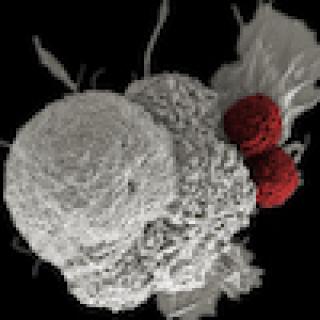News and Events
Celebrating CCR Careers: Alan Rein, Ph.D.
Alan Rein, Ph.D., is a known expert in the field of viral assembly, particularly in retroviruses like the human immunodeficiency virus (HIV). After an extensive career studying molecular mechanisms of retroviral replication and pathogenesis, he has announced his retirement.
Read MoreJordan Meier receives the 2021 Eli Lilly Award in Biological Chemistry
Jordan Meier, Ph.D., Senior Investigator in the Chemical Biology Laboratory, received the 2021 Eli Lilly Award in Biological Chemistry for outstanding research of unusual merit and independence of thought and originality. Dr. Meier’s efforts in defining how metabolism regulates epigenetic signaling in cancer and how metabolite-protein interactions occur in all living organisms were cited as meritorious examples of advancing two fundamental areas of research.
Read MoreSue Wickner receives the 2021 American Society for Microbiology Award for Basic Research
Sue Wickner, Ph.D., Senior Investigator in the Laboratory of Molecular Biology, received the 2021 American Society for Microbiology Award for Basic Research. The award recognizes outstanding scientists whose discoveries have been fundamental to advancing our understanding of the microbial world. Dr. Wickner’s research into the mechanisms of action of molecular chaperones aims to provide insight for future development of drugs for the prevention and treatment of diseases caused by protein aggregation and misfolding, including Alzheimer's, Parkinson's, type II diabetes, cystic fibrosis, and prion diseases.
Read MoreCombination therapy for solid tumors and small-cell cancers studied in new clinical trial
A clinical trial of a drug combination to treat solid tumors and small-cell cancers is being conducted at the NIH Clinical Center. PARP inhibitors can work better when combined with chemotherapy, such combinations can be too toxic, so this study uses a new kind of chemotherapy called PLX038 and combines it with a PARP inhibitor rucaparib to see if the combination of PLX038 and rucaparib can safely shrink solid tumors and small-cell cancers.
Read MoreClinical trial studies combination immunotherapy for colorectal cancer
Colorectal cancer (CRC) affects the colon and rectum, which are located at the lower end of the digestive tract. One of the most common cancers, it often spreads to the liver. Because treatments that aim to use the patient’s own immune system to attack mCRC have not been very successful so far, investigators are leading a study that combines two different types of immunotherapy to see if one can enhance the effect of the other.
Read MoreRegistration Open: Enhancers, Gene Regulation and Genome Organization
Registration is now open for the upcoming Enhancers, Gene Regulation and Genome Organization symposium. The goal of this meeting is to critically address the wealth of new data generated by bulk and single-cell molecular, imaging and computational approaches that are increasingly revealing how the genome folds to faithfully accommodate gene expression programs and cell fate decisions. The goal is to advance an understanding of how transcriptional enhancers function, how to separate cause and effect, and to identify critical questions that will guide future directions. Sessions Include: Enhancer Genetics, Enhancers in Development, Enhancer Biophysics, Enhancer in Disease and Enhancers and ncRNA.
Read MoreSelumetinib offers hope as first FDA-approved treatment for neurofibromatosis 1 (NF1)
Autumn Schierling is one of 50 children who have been participating since 2015 in a clinical trial of neurofibromatosis type 1 (NF1) at the NIH Clinical Center. In March 2020, the results of the trial were published and in April the FDA approved selumetinib as the first treatment for NF1. Brigitte Widemann, M.D., Chief of the Pediatric Oncology Branch who started conducting clinical trials for NF1 in 2001 was quoted as saying, “The medication’s approval is ‘huge progress’ and we will work to make more progress.”
Read MoreClinical trial evaluates a combination therapy for metastatic clear cell renal carcinoma
Kidney cancer is the 6th most common cancer diagnosed in the United States with greater than 73,000 new cases seen each year. CCR investigators are interested in studying a combination immunotherapy for its most common subtype, clear cell renal carcinoma, using Avelumab and interleukin (IL)-15.
Read MoreIn Memoriam: Larry K. Keefer, Ph.D.
The Center for Cancer Research mourns the recent death of past colleague Larry K. Keefer. He made major contributions to the understanding of the chemistry of the carcinogenic nitrosamines.
Read MoreClinical trial evaluates immunotherapy for head and neck cancer caused by HPV
A clinical trial, led by Christian Hinrichs, studies neoadjuvant immunotherapy for HPV-related head and neck cancer. Neoadjuvant means it is given before main treatments such surgery. The goal of the study is to see if T cells given before the main treatment can reduce the risk of the disease coming back and to convert borderline or unresectable tumors to resectable.
Read MoreTrial opens to evaluate a potential anti-metastasis compound
The Center for Cancer Research has opened a phase I trial to evaluate the safety and clinical activity of metarrestin, a compound that suppressed metastasis and extended survival in several preclinical cancer models.
Read More









